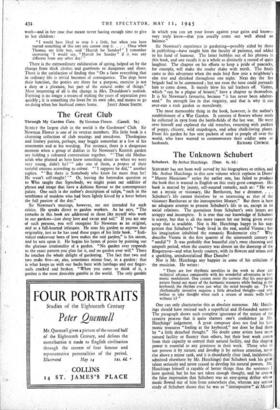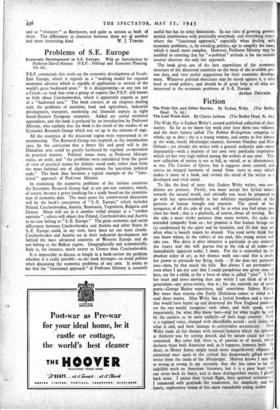The Unknown Schubert
Schubert. By Arthur Hutchings. (Dent. 6s. 6d.) SCHUBERT has not been well served by his biographers or critics, and Mr. Arthur Hutchings in this new volume which replaces in Dents' " Master Musicians " series the earlier one, has failed to produce the book that is wanted in English on this truly great composer. His book is marred by jaunty, self-assured remarks, such as: "He was not a mystic or visionary, like Beethoven, but a dreamer. . Schubert's life cannot therefore be so interesting as that of the visionary Beethoven or the introspective Mozart." But there is here no adequate attempt to present Schubert's life to us, except in its social relations. The quotations from Schubert's own letters are scrappy and incomplete.' It is true that our knowledge of Schubert is scanty, but that is all the more reason for our being given every scrap that is available. Nor is Mr. Hutchings happy in his sug- gestion that Schubert's "body lived in the real, sordid Vienna • but his imagination inhabited the romantic Biedermeier city." 'Why describe Vienna in the first quarter of the nineteenth century as " sordid "? It was probably that beautiful city's most charming and unspoilt period, when the country was almost on the doorstep of the Ringstrasse—and what lovely country, with its flowers and wines and a sparkling, unindustrialised Blue Danube!
Nor is Mr. Hutchings any happier in some of his criticism of the musician. He writes:
" There are few rhythmic novelties in the work to show any technical advance comparable with his wonderful adventures in har- monic modulation. One cannot resist the surmise that his easy-going nature found out many of the harmonic treasures while fooling at the keyboard; the rhythm even just what the mind brought up. To be rhythmically inventive requires a little detached thought—and why bother to take thoukht when such a stream of music wells forth without it? "
One can only characterise this as absolute nonsense. Mr. Hutch- ings should have resisted such a superficial and ill-founded surmise. The paragraph shows such complete ignorance of the nature of the creative process that it quite shatters one's confidence in Mr. Hutchings' judgement. A great composer does not find his har- monic treasures " fooling at the keyboard," nor does he find them by "a little detached thought" No doubt some artists have more natural facility or fluency than others, but their best work comes from their capacity to control their natural facility, and this shaping power is essential to any greatness in their work. Those who do not possess it by,nature; and develop it by serious attention, never rise above a minor rank, and it is abundantly clear (and, incidentally, admitted elsewhere by Mr. Hutchings) that Schubert took his great talent seriously and never ceased to develop his natural powers. Mr. Hutchings himself is capable of better things than the sentences I have quoted, but he has not taken enough thought, and he crewel, the false impression that Schubert was an easy-going drifter whose music flowed out of him from somewhere else, whereas any serious study of Schubert shows that he was as "introspective" is Mozart and as " visionary " as Beethoven, and quite as serious as both of them. The differences in character between them are of another























 Previous page
Previous page